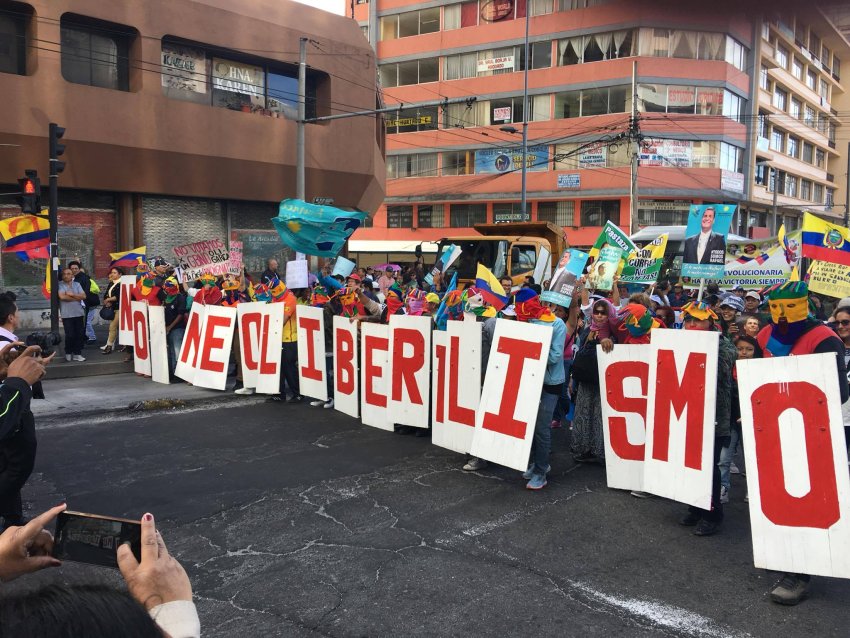
July 5 marked the final breaking point between the increasingly right-leaning government of Lenin Moreno and his leftist predecessor, Rafael Correa.
On that day, nearly 60,000 people filled Plaza Santo Domingo, in the historic centre of Quito, in support of Correa and the pro-poor Citizens’ Revolution he promoted during his 10-year presidency (2007-17).
Protesters came together under the banner of “Indignaté Ecuador” (Be outraged, Ecuador!) to oppose the arrest warrant issued against Correa by Ecuador’s National Court of Justice.
The warrant is in relation to the attempted kidnapping of former Ecuadorian right-wing legislator and journalist, Fernando Balda, which occurred in Colombia in 2012. Balda had been previously charged with supporting the 2010 coup attempt Correa before fleeing to Colombia.
Balda was eventually extradited to Ecuador in October 2012 to face charges of conspiracy to overthrow the government and threatening members of state security, and was given a one-year prison sentence.
In May, the chief prosecutor’s office requested that proceedings be initiated against the former president, following the filing by Balda of a formal accusation of kidnapping against Correa.
Ecuador’s National Assembly declared Camacho’s request inadmissible on June 14, as it was “not for parliament to authorise the prosecution of an ex-president, as provided by the Constitution”.
However, on July 3, Judge Daniella Camacho, who is presiding over the case, ordered that Correa be placed in preventative detention. The government notified Interpol of its intention to extradite Correa, despite a complete lack of concrete evidence.
Correa, who has been residing in Belgium with his family since May 2017, has dismissed the charges as a “government plot”. He has urged citizens “not to worry about [him] but rather worry about the country” and the growing number of neoliberal reforms being implemented by the Moreno government.
The attack on Correa can be seen as the latest example in a series of attempts by right-wing and neoliberal administrations across South America to wage “lawfare” against progressive leaders.
Right-wing forces have used legal manoeuvres and parliamentary and judicial means to either remove progressive presidents from power (as was the case with Dilma Rousseff in Brazil and Fernando Lugo in Paraguay) or to try and prevent them from running again (Luiz Inácio Lula da Silva in Brazil and Cristina Fernandez de Kirchner in Argentina).
Jorge Glas, a Correa ally and Moreno’s vice-president until October 2017, is currently in jail on charges of having allegedly received bribes from the Brazilian construction company, Odebrecht, in exchange for favourable government-negotiated contracts.
The complete lack of transparency and fair judicial procedure in Correa’s case proved to be the final straw for the increasingly organised and militant opposition that has emerged in response to what many see as Moreno’s betrayal of the Citizens’ Revolution.
Among the protesters were prominent social, political and indigenous leaders, as well as former and current parliamentarians who have split from the ruling Country Alliance party and formed the Citizen’s Revolution Movement.
With the support of the former president, a growing resistance has taken shape in the form of the newly-founded Movement of National Agreement that seeks to defend and extend the original achievements and aims of the Citizen’s Revolution. These include resistance to neoliberalism and US imperialism, reduction of poverty and inequality via higher social spending, the defence of the rights of nature, and Latin American integration.
Prominent leaders of this movement include former National Assembly president Gabriela Rivadeneira, former foreign relations and defence minister Ricardo Patiño, and former parliamentarian and feminist activist Paola Pabón.
Revolutionary, left-wing and progressive leaders from across Latin America and the world have also expressed their opposition to what they see as a politically-motivated trial against Correa.
Among them are Venezuelan president Nicolás Maduro, his Bolivian and Cuban counterparts, Evo Morales and Miguel Díaz-Canel respectively, as well as Rousseff, former president of Uruguay, Jose “Pepe” Mujica, leader of the radical left Spanish organisation Podemos, Pablo Iglésias, and Argentine Nobel Prize winner Adolfo Pérez Esquivel.